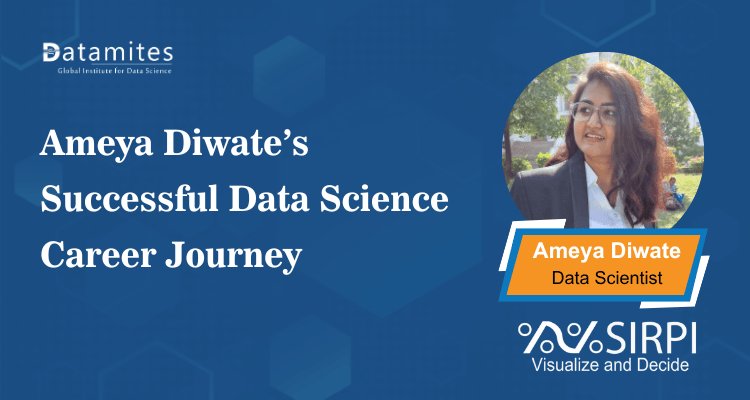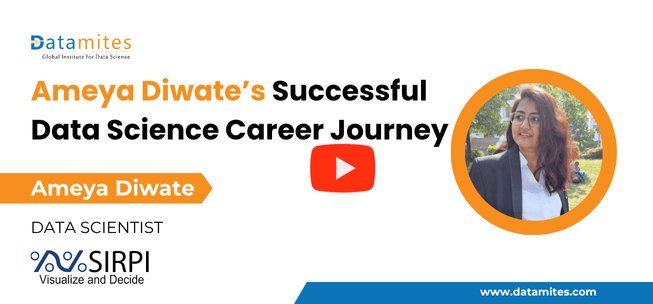Ameya Diwate’s Successful Data Science Career Journey
Discover how Ameya Diwate transformed his career through Data Science, overcoming challenges and achieving success. His inspiring journey highlights the power of skills, determination, and continuous learning.

Breaking into the field of data science can feel daunting for many aspiring professionals. With countless concepts to grasp, technical interviews to crack, and essential soft skills to develop, the path to becoming a data scientist often feels uncertain. But success stories from fellow learners prove that with dedication, structure, and the right training, these challenges can be overcome.
In this exclusive interview with DataMites Institute, we dive into the inspiring success story of Ameya, a recent alumna who made a successful transition into a data science career. Ameya shares how real-time projects, rigorous interview preparation, and dedicated support from DataMites Institute helped her secure her first Data Scientist role at Sirpi, Bangalore.
If you're currently undergoing training, preparing for interviews, or considering a future in data science, Ameya's story offers motivation, insider insights, and practical tips. To gain more inspiration, you can also watch DataMites success stories and learn from others who turned their ambitions into reality.
Ameya’s Successful Data Science Journey with DataMites
Learn how Ameya conquered early career obstacles and kick-started her data science journey with the help of DataMites.
Q1: Can you briefly introduce yourself and your background?
I completed my BTech in Computer Technology from Nagpur. Coming from a small city, it was difficult to get placements. Though I got selected for one, I never received the offer letter, which was very demotivating. I tried through different portals like Naukri and LinkedIn, but being a fresher, it was tough. I always wanted to get into data analytics or data science, so I took a local course, but I wasn’t satisfied. After researching, I found DataMites Institute and decided to enroll there.
Q2: What challenges did you face when trying to start your career?
It was quite difficult initially. Despite cracking interviews, I wasn’t getting actual job offers. My college's limited reputation also made it harder to break into companies. I was stuck, unsure how to progress but determined to pursue data science.
Q3: How did you come across DataMites, and why did you choose them?
After researching various online courses and trying different demos, I came across DataMites Institute. I immediately got a positive feeling about their program and the comprehensive training they offered, so I decided to join.
Q4: How was your learning experience with DataMites Institute?
It was a good experience. The training started from the basics, including Python, machine learning libraries, SQL, data visualization, and even introductions to Big Data and PySpark. The structured approach boosted my confidence, especially after struggling earlier with understanding simple coding concepts like brackets and syntax.
Q5: What role did projects and assessments play in your preparation?
The projects were crucial. We worked on four different projects, which helped me gain practical experience. Following the projects, there were assessments and mock interviews that prepared me for real-world interviews.
Q6: How was your resume preparation process?
A: I had a basic resume initially, but it wasn’t getting shortlisted. After clearing my mock interview, the PAT (Placement Assistance Team) helped me rebuild my resume. After several revisions, I achieved a 90% resume score, and soon after, I started receiving interview calls, even from external portals.
Q7: Did the mock interviews help you?
Absolutely. I had two mock interviews, each providing valuable feedback. I improved after each one, especially in Python coding. By the final mock, I was confident in both technical and conceptual areas.
Q8: Did you have prior coding experience before joining DataMites Institute?
I had some exposure to Jupyter Notebooks through a data analytics course in my hometown, but I lacked clarity in basic coding concepts. Through DataMites Training Institute, I gained a strong foundation and overcame initial confusion regarding syntax and coding logic.
Q9: What was your study strategy during the course?
I focused on practicing everything covered in class first—especially Python notebooks—before exploring external coding platforms. I believe that for data science, understanding the logic and the data is more important than high-level coding like software developers do.
Q10: Were you targeting a specific industry or domain for your career?
I didn’t have a specific domain like HR or healthcare in mind, but I am particularly interested in AI. My plan is to strengthen my foundation in data science and then dive deeper into AI, as data science is essential for understanding AI concepts.
Q11: How would you summarize your overall experience with DataMites?
It has been a positive and transformative experience. The step-by-step approach—from Python basics to advanced machine learning algorithms—helped me build the necessary skills and confidence to pursue a data science career.
Q12: How many interview rounds did you face for your new role?
I had two rounds. The first one was a virtual HR interview. After that, I had a direct, in-person interview with the CEO at their office. It was an insightful experience where both technical and soft skills were evaluated.
Q13: How much time did you spend revising after classes and before assessments?
It depends on individual capacity. For me, writing things down during class really helped with retention. I maintained a dedicated notebook for all key points discussed in class. Even if I didn’t revise the same day, a quick glance at my notes the next day refreshed everything.
Before mocks, I organized my notes better, especially for complex topics like algorithms. I also referred to online resources like GeeksforGeeks to strengthen my understanding. Organization is key — cluttered learning doesn't stick.
Q14: What kind of questions were asked during your interview?
The CEO asked me several technical questions, some based on my projects, and others to test my fundamentals:
- Project Discussions: He asked me to explain the projects I worked on, specifically what parts I did independently versus with help.
- Technical Fundamentals: Questions on fetching tables from databases, algorithm selection based on data types, and trial-and-error methodology in model building.
- Hyperparameter Tuning: Why it's important and how to approach it.
- Data Imbalance & SMOTE: Why SMOTE (Synthetic Minority Over-sampling Technique) is used and the impact of unbalanced datasets.
- Deep Learning (CNN): Since one of my projects used Convolutional Neural Networks, he asked about the architecture and how CNN works in depth.
Insights from Ameya's Transformation into a Data Scientist
Explore the key lessons and strategies that helped Ameya transition into a successful data science career with the support of DataMites Institute.
- Resilience Pays Off: Despite early setbacks, including lack of job offers and limited exposure due to her college background, Ameya's persistence helped her break into the data science field.
- Right Training Makes a Difference: Choosing DataMites Training Institute for structured, comprehensive training—from Python basics to advanced machine learning—helped her build both confidence and technical competence.
- Hands-On Projects are Essential: Practical projects during the course provided real-world exposure, enhancing Ameya's problem-solving skills and making her interview-ready.
- Mock Interviews Sharpen Readiness: Participating in multiple mock interviews helped identify areas of improvement, especially in Python coding and conceptual understanding.
- Resume Optimization is Critical: With guidance from DataMites Placement Assistance Team, refining her resume to industry standards significantly increased her interview calls.
- Organized Learning Boosts Retention: Ameya highlighted the importance of writing notes during classes and maintaining organized study materials for effective revision.
- Interview Preparation is Multi-Dimensional: Her interview process included project discussions, algorithm application, database queries, hyperparameter tuning, SMOTE for data imbalance, and deep learning (CNN) concepts.
- Communication Skills are Non-Negotiable: Ameya emphasized that strong communication is as important, if not more, than technical expertise, especially for explaining projects and ideas to others.
- Aptitude and Logical Thinking Matter: Practicing aptitude and critical reasoning helps in cracking assessments and interview rounds.
- Soft Skills Development is Ongoing: Although she missed the DataMites soft skills sessions due to schedule constraints, Ameya acknowledged their importance and developed her communication through self-practice.
- Tailored Study Strategy is Key: Ameya stressed understanding the logic behind the code rather than blindly focusing on advanced programming—an essential mindset for aspiring data scientists.
- Foundation First, Specialization Later: Building a strong data science foundation is vital before diving into specialized fields like Artificial Intelligence.
Today, data science stands out as one of the most popular IT courses, opening up exciting career opportunities for individuals from diverse educational backgrounds. With the growing importance of data-driven decision-making, training institutes like DataMites Institute are empowering thousands of aspiring professionals, just like Ameya, to build successful careers in the rapidly evolving tech industry.
If you're considering following in Ameya's footsteps and stepping into the world of data science, now is the ideal time to enhance your skill set. According to Precedence Research, the global data science platform market was valued at USD 150.73 billion in 2024, is expected to reach USD 175.15 billion in 2025, and is projected to surpass USD 676.51 billion by 2034, growing at a CAGR of 16.20%. With industries generating vast amounts of data, the need for skilled data professionals continues to surge. Choosing a trusted training provider that offers hands-on projects, real-world exposure, and job assistance is crucial for launching a successful career. Enrolling in a top-rated data science institute in Bangalore, Chennai, Hyderabad, Pune, Mumbai, or Delhi can help unlock a world of tech opportunities.
For Ameya, who comes from a small city with limited placement opportunities, structured training and expert mentorship made all the difference. Through comprehensive programs in Data Science, AI, Machine Learning, Python, and Data Analytics — supported by globally recognized certifications from IABAC and NASSCOM FutureSkills — she built the confidence and technical expertise needed to break into the data science industry.
DataMites Institute offers data science courses in Bangalore, Chennai, Hyderabad, Pune, Ahmedabad, Coimbatore, and Mumbai, along with flexible online learning options. This makes high-quality data science education accessible to freshers, working professionals, and career changers — just as it did for Ameya.

